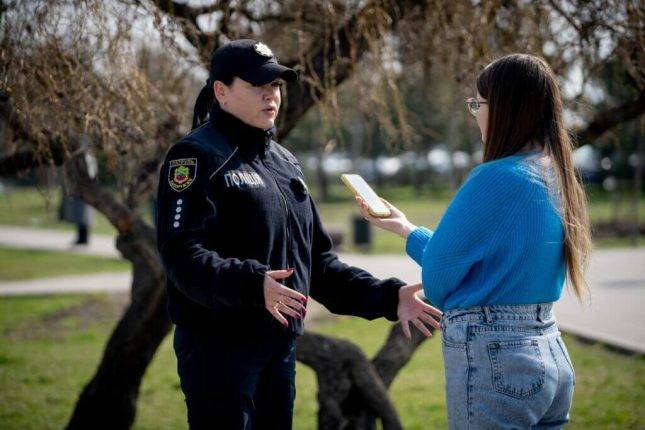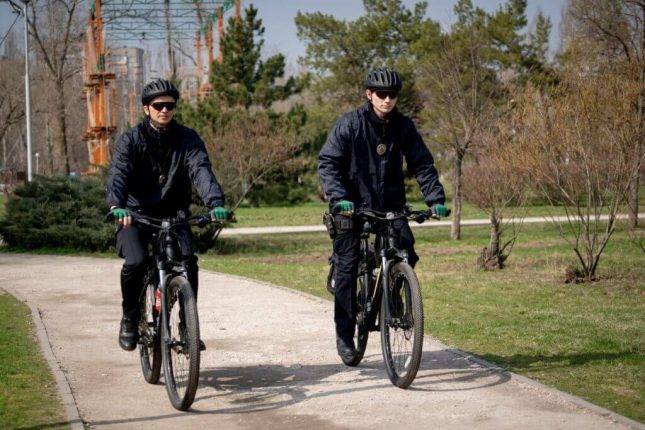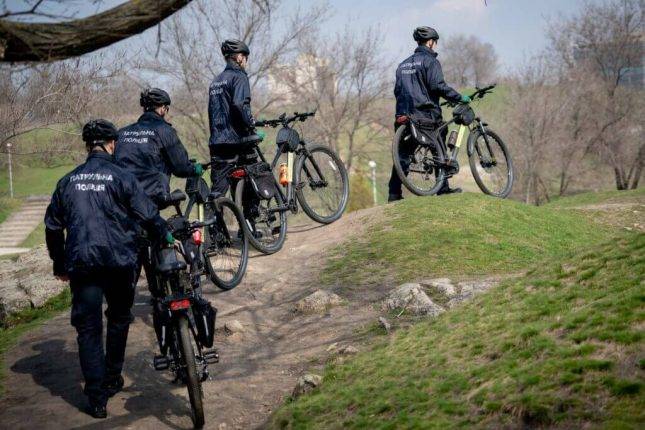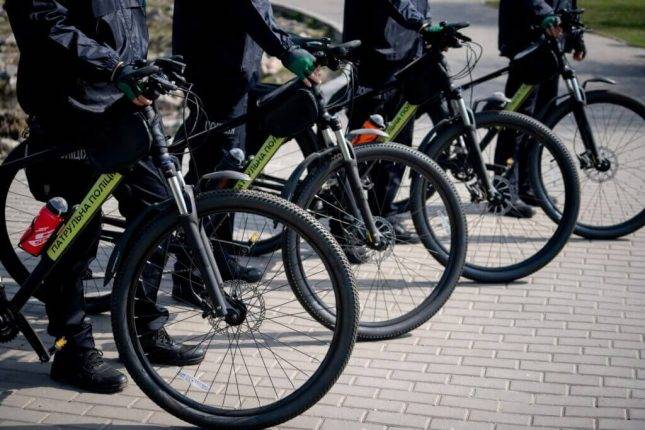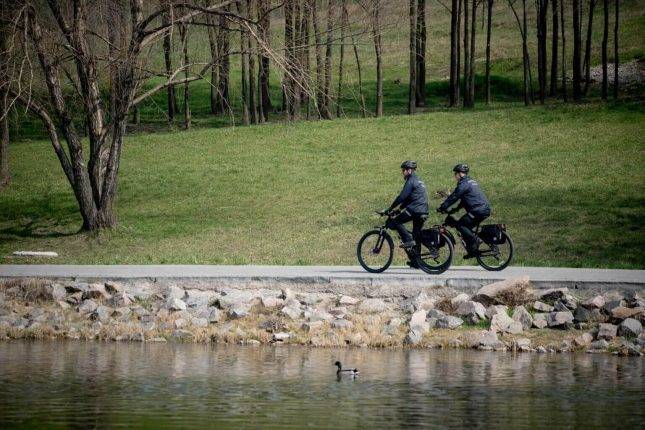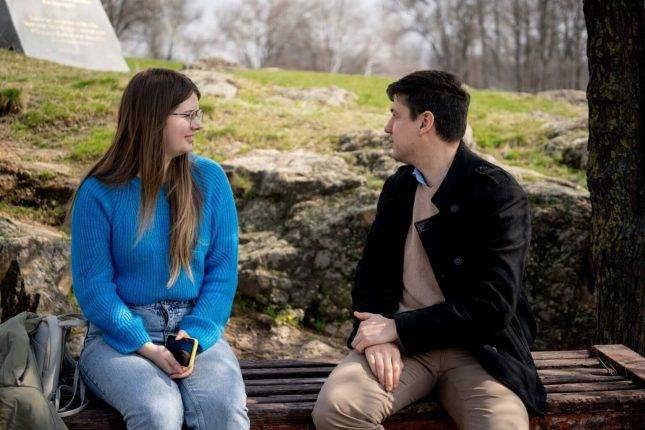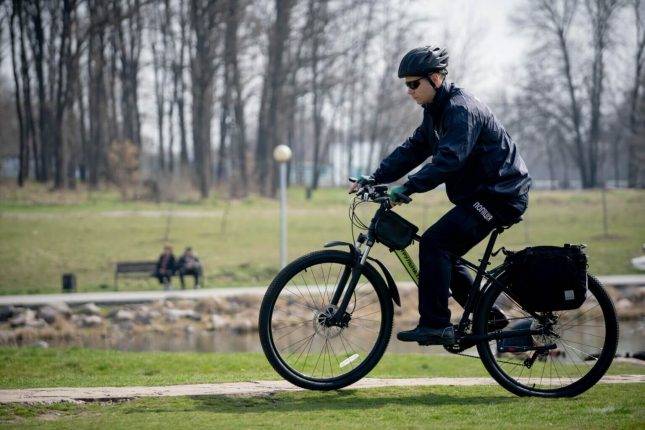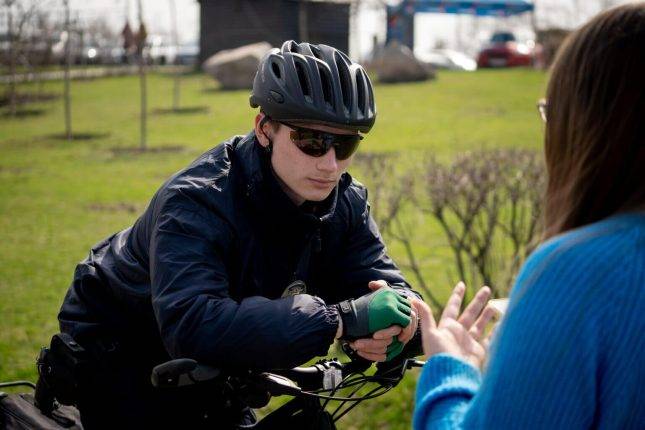
Bicycle Patrol 2.0: Strengthening safety and accessibility in Zaporizhzhia
01/11/2023
Parks, squares, fountains, pedestrian areas – anywhere that is hard to reach by car – can be especially unsafe if there is no police bicycle patrol in the city. Zaporizhzhia may be one of Ukraine’s biggest industrial towns, but it is also known for its vast green recreation areas: the city’s Khortytsia Island alone covers 23.5 square kilometres.
To make this vast area more accessible to police patrols, ‘Spilno Hub’, an NGO in Zaporizhzhia, is helping to develop the city’s bicycle infrastructure. Thanks to the support of the European Union and UNDP in Ukraine, in 2023, the organisation supplied the local patrol police with new bicycles and all the equipment needed to launch more regular bicycle patrols.
We met with Iryna Serhienko, the head of the Public Relations Department of the Patrol Police Department, in the Zaporizhzhia’s Voznesenivskyi Park. The ‘Spilno Hub’ NGO approached her with a proposal for cooperation.
“It would have been tough to launch more bicycle patrols without the help of ‘SpilnoHub’,” says Iryna Serhienko, head of the Public Relations Department of the Patrol Police Department.
Every year, from April to September, the police bicycle patrol goes out on 12-hour shifts in the daytime. Police officers cover many kilometres on their bikes during the day, so these vehicles require careful maintenance, repair, and spare parts replacement.
“Safety is crucial for me in this job – the safety of our citizens and children,” says Serhienko. “I want every child on the streets of our city to feel safe. This is a priority for each of my colleagues and me, and that’s why we work for it. At first, it was quite scary. But when you see people’s eyes shining with gratitude, it encourages you. That’s why I want to work and stay here in Zaporizhzhia,” Iryna says. “After all, who else can do it, if not us?”
In the early summer of 2022, the police approached ‘Spilno Hub’ with a request that it help repair bicycles to continue patrolling hard-to-reach places in the city.
“This year, out of ten bicycles, the bicycle patrol had only three in use,” says Iryna Shevchenko, manager of the Velopatrol 2.0 project and member of the ‘Spilno Hub’ NGO.
“We suggested applying for an EU and UNDP grant together and purchasing new bikes, instead of repairing the old ones. At the same time, we increased their number to 12.”
Until 2022, Iryna Shevchenko was the head of the organisation’s branch in Melitopol, where she had lived for more than 10 years. ‘Spilno Hub’ worked in cities in Zaporizhzhia, Kherson, and Donetsk regions: Zaporizhzhia, Kherson, Melitopol, Berdiansk, Sloviansk, Druzhkivka, etc.
“I communicated with the Melitopol bicycle patrol last year and the year before,” says Shevchenko.
“‘Spilno Hub’ trained, equipped, and launched the patrol in Melitopol and Berdiansk. In Zaporizhzhia, we joined the support of the local bicycle patrol later.
“In early 2022, we had a strategy session and made plans for the whole year. Unfortunately, none of them were achieved: full-scale war broke out a few weeks after our session.”
Shevchenko’s family lived for a month in Melitopol after it fell under Russian military control. In the spring, they evacuated to Zaporizhzhia, where Shevchenko became actively involved in the work of her organisation’s local branch. But in October 2022, when massive attacks and shelling began all over Ukraine, Shevchenko, pregnant at the time, was forced to pack up all her belongings and move to the Odesa region, where she had been born and spent her childhood.
“I lived for a month under occupation and witnessed everything with my own eyes,” Shevchenko says. “We went through a lot, including evacuation. We saw the occupiers and talked to them. We saw what they were doing to our like-minded (pro-Ukrainian) people. There are still people going missing. Nothing good is happening out there.”
Shevchenko combines her public activities with work in the IT sector. Cycling is her main hobby – she participated in the Ukrainian amateur cycling championships in 2021.
“My husband and I had two old bicycles, and one day we felt like going for a ride somewhere,” says Shevchenko.
“We realised it was a cool way to spend time together. Later, we joined the local cycling community in Melitopol: we rode on weekends, became interested in cycling competitions, and started participating in bike rides. We joined in any cycling projects whenever we could.”
From the beginning of the full-scale invasion, the NGO, which had previously been involved in developing local democracy and bicycle infrastructure, began to help the State Emergency Service and the blood donation centre.
“Part of our team, just like me, came from Zaporizhzhia,” says Shevchenko. “I coordinated procurement and tenders remotely, with the help of my assistant Viktoriia, who is now in Kyiv. Pavlo and Liliia, who stayed in Zaporizhzhia, helped a lot with the bike patrol project.”
We also spoke to Pavlo Voskoboinikov, the ‘Velopatrol 2.0’ project assistant, in Zaporizhzhia. He organised the supply of bicycles and all their components to the patrol police as part of the project supported by the EU and UNDP in Ukraine.
“Thanks to all this, the bicycle patrol can do their job safely,” says Pavlo Voskoboinikov, ‘Velopatrol 2.0’ project assistant and member of the ‘Spilno Hub’ NGO in Zaporizhzhia.
“First of all, we bought bicycles and police equipment,” says Voskoboynikov. “We purchased comfortable clothes, shorts, polo-neck shirts, and raincoats. Since we also noticed that patrol officers always carry a tablet and a first aid kit, we also provided handy bags that can be attached to the bike frame.”
“We included basic equipment: headlights, flasks, pumps, chains, spare cameras, and anti-puncture gels. We also bought power banks, because police officers work on a tablet all day. Thanks to all this, the bicycle patrol can do their job safely.”
Voskoboinikov joined ‘Spilno Hub’ in 2019 when his son grew up and he had more time. He now combines his social activities with working at a bank. When he saw he had the opportunity to contribute to the development of cycling infrastructure, he joined in the project. This is the fourth year Voskoboinikov has been actively involved in all ‘Spilno Hub’ events and projects.
“We’ve been supporting the bicycle patrol for a long time – it’s a great way to improve our safety,” says Voskoboynikov. “We have such beautiful recreation areas in the city, like Khortytsia Island, Dubovyi Hai, and large park areas where you can’t even drive a car. And now the bike patrol can get to places where a regular patrol would not even be able to go.”
Zaporizhzhia Police Bicycle Patrolman Hennadii Volkov is 30 years old. He says he learned to ride a bike practically before he could walk. He patrols park areas and the island of Khortytsia with his colleagues on their bikes.
“We show that we’re there for you, and that you can turn to us for help,” says Volkov.
“Our main task is crime prevention,” he adds. “We show that we’re there for you, and that you can turn to us for help. People often ask us to show them the way to places, and other things. We also work as patrol police in various bicycle routes in the city.”
The ‘Spilno Hub’ team is committed to restoring and improving cycling infrastructure in the cities where the organisation’s branches are located. In Zaporizhzhia, they collaborated with the city programme and strategy for the development of cycling infrastructure, and before the invasion of 2022 they had funding for a project to build the first section of a safe bike lane in the city.
In partnership with the bicycle patrol of the Zaporizhzhia Patrol Police Department, ‘Spilno Hub’ also planned to hold the Light Up the Night campaign in October 2022. Due to the massive shelling of Zaporizhzhia by the Russian armed forces, it was forced to postpone it to early November.
During the campaign, the bicycle patrol stopped cyclists, attached reflectors to their bicycles, and stressed the importance of using these devices in the dark.
“You’re much less protected on a bike,” says Shevchenko. “All children would ride bikes if the roads were safe. We miss Melitopol very much, and we want to return there. We have plans to improve things there as well.”
“It’s important to transform the city so that not only cyclists but also pedestrians and other road users feel comfortable in it,” says Voskoboynikov. ”I have a son growing up, and I don’t want him to have to walk along old, broken-up sidewalks.”
‘Spilno Hub’ is one of the organisations that received support under the ‘Response of civil society to the needs of women and men, especially those living in hard-to-reach places and representatives of vulnerable groups’ programme, which is supported by the European Union (EU) and the United Nations Development Programme (UNDP) under the EU-funded EU4Dialogue regional programme to address the most urgent needs of war-affected communities in Ukraine. The EU4Dialogue project aims to build a solid foundation for peace by creating better socioeconomic conditions and a safe environment for war-affected communities.
This article was produced with the European Union’s and UNDP’s financial assistance under the EU4Dialogue programme. The contents do not necessarily reflect the views or positions of the European Union or UNDP.
Stories
-
Katarina Mathernova: If Ukraine had a human face and a human spirit, it would be 10-year-old Roman Oleksiv
-
A regional mission to drive social entrepreneurship: the story of Ksenia Kosukha
-
EU restores safe water supply for 100,000 Ukrainians affected by war
-
Promoting IT during the war: Lviv IT cluster and how EU4Digital helps
-
Frontline digitalisation: Kharkiv IT Cluster collaborations
-
How EU4Youth is driving opportunity and success among young Ukrainians
